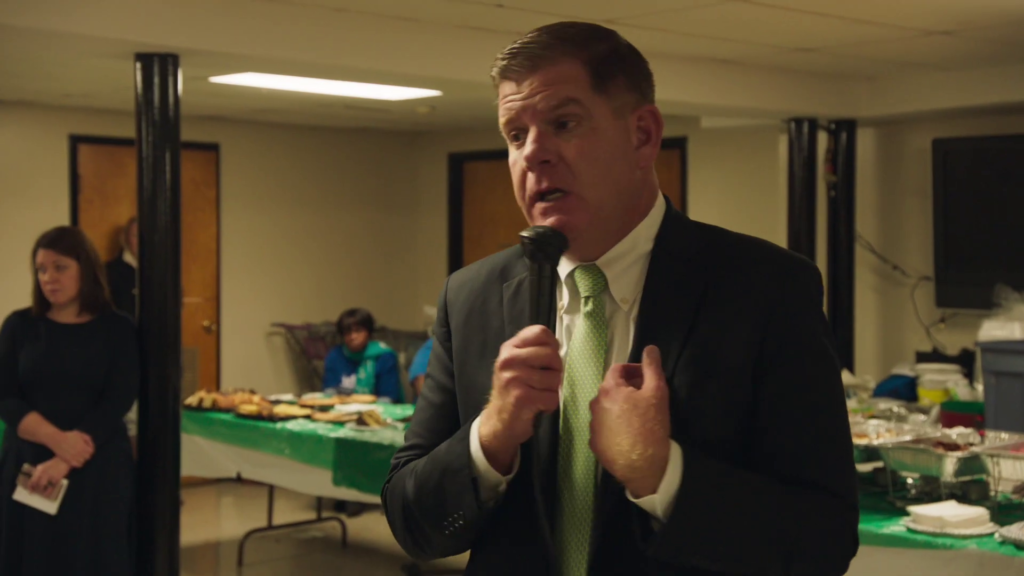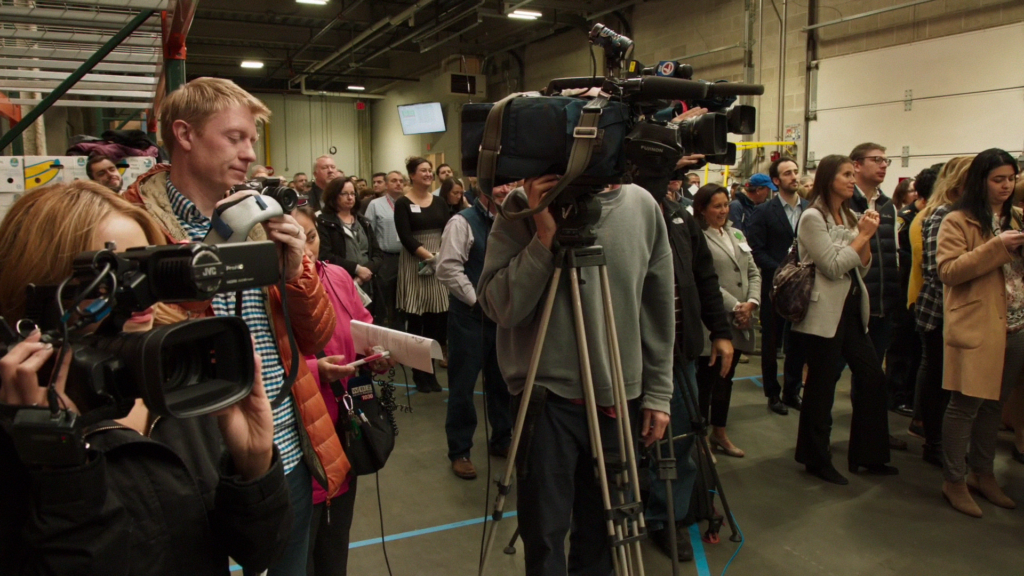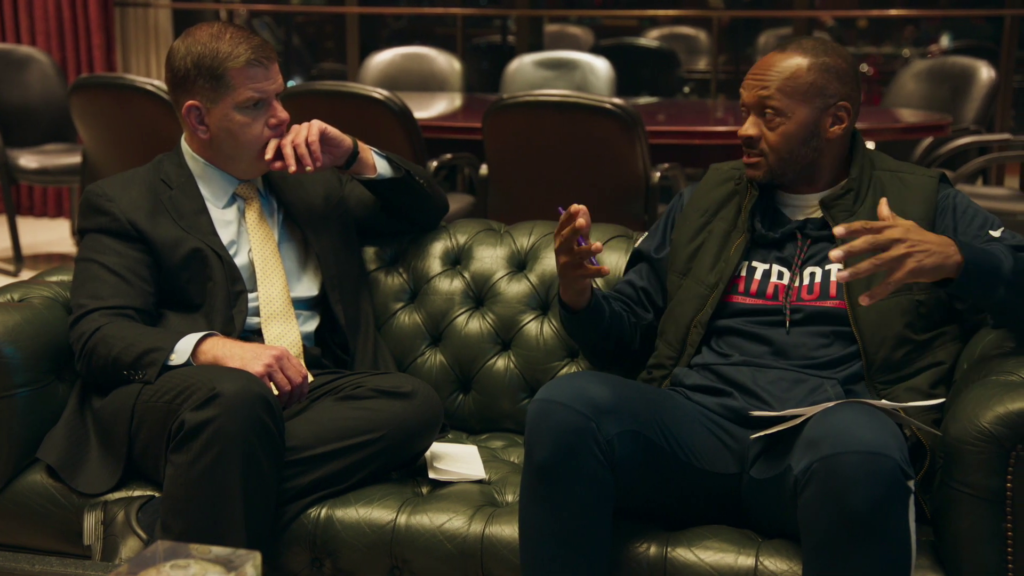
Film Review: City Hall
Produced, directed, and edited by Frederick Wiseman. US, 2020, 272 minutes.
Available on virtual cinema platforms.
Speaking at the International Documentary Film Festival Amsterdam in 2016 following the release of his nth masterpiece In Jackson Heights (2015), nonfiction filmmaker Frederick Wiseman made a statement he’s been delivering in slight variations for as long as I’ve been reading his talks: “I don’t know why anybody agrees to be filmed,” he said. “But the fact of the matter is, it’s not a problem—99.9% of people agree and 99.9% of people don’t act for the camera. Possibly because most of us aren’t good enough actors.” This belief is demonstrably central to Wiseman’s filmmaking practice, where he and a small crew shoot events, institutional work, and other unscripted meetings and occurrences then edit the resultant footage into scenes that elide his presence and therefore represent those happenings within a specifically cinematic realism. But I suspect he’ll need to amend the line at least a little bit while talking about City Hall, his 44th feature, which continues his long tradition of movies about American governmental services but also befits his parallel series of performance films—by capturing with great clarity that 0.1% ready and waiting to put on a show.
Most often that means Mayor Marty Walsh, who Wiseman frames up in this Massachusetts-set film not so much as a meat-and-potatoes public servant but rather as Boston’s chief elected orator. He’s seen in various industry meetings, at outdoor public gatherings (the film was produced from fall 2018 through early 2019), and even in semiprivate groups, always giving some iteration of his own recurring statements. Many of these speeches are understandably crafted to inform citizens about public services—but he’s also shown dropping lines against Trump, usually in places where doing so can either benefit his political standing or at least amp up the room hypeman style. And he’s repeatedly depicted unfurling memories from his own struggles with illness and addiction to better relate with and validate whatever congregation he’s speaking to, which range from a Yes on 1 nurses rally to a group telling war stories one by one on Veteran’s Day—in a scene that goes on for nearly 20 minutes before Walsh appears with an uncanny suddenness, as if to underline the film’s presentation of him as the city’s omnipresent group leader. “I think that’s what he learned in [Alcoholics Anonymous],” Wiseman recently told the Boston Globe, before sneakily articulating City Hall‘s real thematic focus. “As he describes it, and friends of mine have described it, you get up and you tell your story.”
Walsh’s stories are not presented as two-faced or even as insincere, not played for satire or even for critique—we’re very far removed from the acid-laced gaze of Wiseman’s last film, the hilariously cruel Trump-country portrait Monrovia, Indiana (2018). Indeed there’s even a reverence to the film’s depiction of Walsh that if anything limits its artistry a small amount. But City Hall nonetheless clearly implies, via editorial decisions and with increasing directness, that Walsh’s own contributions mostly consist of communicating and narrativizing. Speaking to the Green Ribbon Commission tasked with “the city’s next phase of climate work,” he talks mostly about “getting editorial onboard.” In a meeting with NAACP representatives where they speak about the public perception of Boston’s racist histories, the sound design is sure to include his offhand remark that “it’s about marketing.” And right at the start there’s a crucial moment, presented almost like introductory remarks for the film itself, where Walsh diagnoses the ostensible problems with his administration by claiming they’re not yet “telling the story” of the work they’re already doing.
In this specified focus City Hall eventually captures—right below its surface portrait of elected officials and civil service—an ineffably comic something about contemporary work culture both government-funded and otherwise. And that something becomes the deeper subject of the film: the idea that in the present day US, the work is more in the telling than in the working.

That’s backed up and thoroughly emphasized by many other scenes Wiseman includes around his central figure. The Walsh-less parts, like those featuring him, go far beyond that breathtaking edifice at Government Center to make a record of the wider city and its surrounding areas, depicting conversations and events held in countless conference rooms (where Dunkin cups and framed sports memorabilia are constant presences), in local institutions from grocery stores and food banks to Faneuil Hall and Fenway Park (the city’s stark lack of physical distance between the community-run and the corporate-owned clear even on digital video), and in neighborhoods from Downtown and the North End to Dorchester and Roxbury (which receives the best of the film’s ample streetscape montages, with shots displaying Washington Street businesses like the Latino Beauty Salon and Micky’s Barber Shop alongside a variety of weathered street art that will now survive for the historical record long after someone from city hall approves taking it down).
Even in a lot of these other spots, maybe even where you’d least expect it, the Walsh-intro’d themes of governing as marketing and working as performing recur again and again: Like in one scene where addiction is discussed in terms of whether the locals refer to it as Methadone Mile or Recovery Road, or in another where a lecturer attributes her professional success to a close study and subsequent utilization of masculine traits within a male-dominated work culture, or in another where the matter of teenage homeless is confronted mostly by people who put at the center of their discussion the need to, you know it, “tell [their] story”—part of the way this movie exactly articulates modern American liberal-political culture is that no matter what social issue a person is speaking about, they mostly just sound like they’re trying to secure financing to produce a documentary.
This depiction of media industry-inspired conference-room language, with people constantly emphasizing small practical steps and big public statements, is only a small part of what’s going on in City Hall. Because even just taken as a community portrait of Boston in the midst of what’ll now forever be known as “the moment before the pandemic,” it’s a work of massive regional significance. Beautifully captured is the increasingly tired sports obsession (depicted via a medium-energy Sox parade and a variety of moderately pandering remarks from people like Walsh), our frumpy urban fashions (Canada Goose and North Face logos abound), and of course many specific contours of the Boston accent and its attendant diction (for instance the lack of offensive comments and relatively controlled enunciation places this as a specifically modern picture of Boston’s professional culture, far removed from the fuck-punctuated backroom talk of the 20th century days that, say, George V. Higgins documented with his political novels—although his longform nonfiction, some of which shares a lotta territory with City Hall, was admittedly less vulgar).

But pleasurably discursive though it may be, City Hall always comes back to its overriding structural principle of authority figures communicating—even in the shots that depict BPD cops at work, where they’re usually just seen mechanically debriefing each other under a Blue Lives Matter flag. So it’s logical that for a climax the last hour delivers two scenes where the people of Massachusetts, after receiving messages for basically the whole film, finally get to talk back.
The first is a community meeting regarding the proposed cannabis shop 617THC, then applying to open a location on Bowdoin Street. For the attendees opposed to the shop’s placement (it never opened), and frustrated with the availability of public services in general (some citing for instance that they’d like more police on the local beat), the reps of 617THC essentially become analogues for city government in toto—and this being a rare chance for the attendees to speak their piece to some kind of power, that’s exactly what they do, often framed by Wiseman’s cinematographer John Davey in opposing profile shots that really play up the dialectical qualities of the action (it’s worth noting that the concerned individuals are backed by representative power of their own, State Rep. Liz Miranda, who’s also depicted speaking at some length).
City Hall‘s other example of the people talking back is a scene that for me sticks out like a sore, not just from the rest of this movie but from most of Wiseman’s oeuvre period. An official who the Globe helpfully identifies as city housing inspector Israel Timberlake visits the home of a 70-year-old man who’s battling a rat infestation that’s being exacerbated by a feud with his landlord who’s also his brother. Presuming he’s got to give the hard sell to Timberlake, and very cognizant of the camera in the room, the mustachioed gentleman tells his tale with an undeniable theatricality, even gesturing towards the camera itself—which at one point has to swing away from his gaze, as if to at least briefly maintain the standards of cinematic realism that Wiseman typically upholds. For a second I even questioned how it made the final edit—tainted as it is by the sort of camera-influenced acting-out that Wiseman’s on-record as being apt to redact. But then I remembered that by violating those very rules, the scene perfectly complements the larger subjects of City Hall: suggesting that if modern American life has turned even our elected officials into glorified p.r.-department hacks, then it stands to reason that it’s also done the same to everybody living under them.
And so the performance angle of City Hall reflects the whole in a vital way, speaking to a tendency deep-seated in the people it depicts to prioritize mass communication and media perception above the rest, even above the work itself, to a point where the city’s top official becomes a traveling raconteur and the average citizen just one of countless performers on the lawn. Along that line, one of the film’s last images before a concluding Walsh speech is a small group of cops not on the beat but on a stage, presenting color guard and singing. It’s yet another rehearsed act meant to symbolize real labor, concluding a film that’s constantly returning to that same concept, and is therefore cast with people who cut against Wiseman’s aforementioned filmmaking philosophies by regularly proving themselves nothing less than “good enough actors.” [★★★★]

